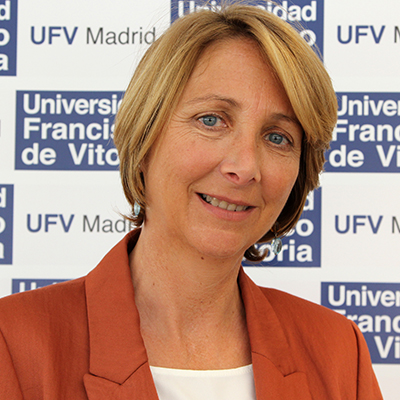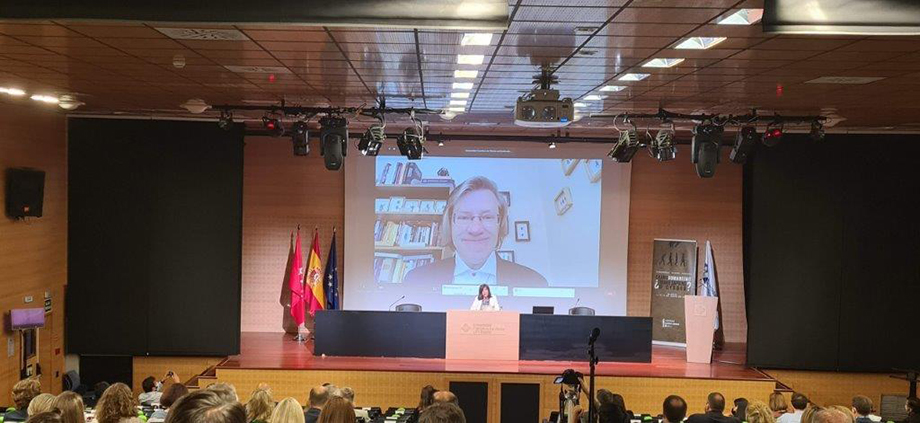Oxford University Professor, Anders SandbergIn the inaugural conference of the Congress on Transhumanism at the Francisco de Vitoria University, he stated that "the fundamental debate on this issue is whether through transhumanism we will continue to be human, or, on the contrary, we will lose our human essence". Well, from different approaches and angles, several speakers alluded to this question, in one way or another.
The last one to do so was Professor of Philosophy Juan Arana, of the University of Seville, who, in his closing remarks, pointed out that "our struggle is not against transhumanism, but for the survival of man". In addition, Juan Arana wondered about the essence of what is human in the face of the different transhumanist currents; and affirmed that "the philosophy of transhumanism is full of holes", and that "it is necessary to measure the consequences of our capabilities".
"All transhumanism is a hollowing out and transposition in techno-scientific terms of what it is to be human." "We will continue to think about what it means to be human and to work on transhumanism and posthumanism. For the moment, we are not cyborgs but sapiens," he said. Elena PostigoThe director of the Open Reason Congress in the conclusions. Postigo referred to the desire for immortality and transcendence to which mankind is called and, as he pointed out, "the desire for immortality and transcendence is the only way to achieve it. in an interview with OmnesHe reiterated that "it is in our hands to know how to use science and technology prudently and responsibly, at the service of people and the common good.

Professor Elena Postigo revealed to Omnes that "it was María Lacalle who, exactly one year ago, proposed this Congress to me". So it seemed logical to talk to María Lacalle, Vice Rector for Faculty and Academic Planning at the University Francisco de Vitoria, and Director of the Instituto Razón Abierta. We talked with her, particularly on the subject of her specialty, the family, and transhumanism. In addition to her university work, María Lacalle is the mother of six children and has four grandchildren.
The first question is obvious: How did you come up with the idea for this Congress? Normally, intuitions are the result of work.
̶ It was not my illumination, but that of the whole team. From the Open Reasoning Institute we try to promote in the University the proposal of Benedict XVI to propose an open reasoning approach to university work. He said that the university is the house where truth is sought, and to know the truth we must try to see the whole of reality, not just a small part of it, fleeing especially from the scientistic reductionism that is so frequent nowadays. Combining this aspiration to know the whole truth, it is a matter of asking reality the most relevant questions for the human being, going beyond the limits of each science. And also taking into account what John Paul II told us, that the University has to investigate the challenges of each time, trying to offer proposals that are for the good of the person and the common good. Thinking about what is around, one of these challenges is transhumanism, which also, as it is transversal, has an impact on all areas of knowledge and allows the inclusion of the entire university community.
The first day of the congress has passed. The second day has just begun. At the risk of being unfair, because perspective is needed, can you comment on anything that has struck you about this first day?
̶ Something that we have just discussed in the team is that outside speakers are surprised by how we approach things in a way that is intrinsically related to philosophy. That is, philosophical reflection is not a cherry on top of a purely technological talk, but here we approach things in an integrated way. And we've been delighted that people outside recognize that difference, because that's what we're trying to do.
We have seen round tables with a historical, cultural, medical, engineering, etc. approach. You are participating in one on family, with a strong title: 'Towards the dissolution of the family in a post-human utopia'. How can transhumanism impact such a vital institution for society as the family?
̶ Here we could ask ourselves about what anthropological conception underlies transhumanism. Throughout yesterday we saw that, on the one hand, one sees a materialism and a mechanicism; on the other hand, as a spiritualism, that proposal that Sandberg made to us at the beginning, the aspiration to scan our brain and upload it to the cloud. Be that as it may, the two currents, although apparently opposed, in the end coincide in something, which is an unfair understanding of corporeality. And from a realistic anthropology we must affirm that we are bodily beings. We are body, a body open to infinity, an incarnated spirit, but we are corporeal; we do not have a body, but we are body. And without corporeality there is no family, conjugal love is a carnal love, it is a love that includes sexual surrender, procreation is corporal.
And what do we find in these transhumanist proposals? That in a certain sense they also converge with the gender proposals. There are two major issues. One, what they call morphological freedom, to modify or manipulate the body as one wishes, including sexual identity; and on the other hand, the aspiration to free women from the 'unbearable burden' of pregnancy and motherhood. It is an ancient claim.
It seems that these things are coming up now, but we can remember Simone de Beauvoir, when she said that women are imprisoned in an annoying body and that they must be freed from that body; and above all from motherhood. To achieve this, work is being done to achieve asexual reproduction. And we are familiar with the pretension of obtaining artificial wombs, generating gametes artificially, in such a way that it is not the woman who has to carry this heavy burden. And also, by the way, it will be possible to dispense with men as well... Well, this is a joke...

Through in vitro fertilization there is already some of that....
̶ There is already some of that. We already see how at a given moment sexuality is detached from procreation, and now what we see is that it is not only sex without procreation but procreation without sex. What impact does all this have on the family? Obviously, it destroys all the basic family relationships: the conjugal relationship, the filiation, the kinship relationship, etc. We do not have time now to go deeper into the matter. Besides, between family and person there is a biunivocal relationship, isn't there? The person cannot develop properly without healthy family relationships, and at the same time, without a balanced person, a family cannot be constituted.
To the extent that a person is more machine-like and less human, what would those relationships be like? What kind of relationship can there be between a person and a machine? What about feelings, emotions, etc.?
̶ Indeed, it would not be a personal relationship, and therefore there could be no love relationship. In any case, I have not investigated that part of transhumanism that aspires to the cyborg, or the man-machine hybrid, but rather that part that converges with gender anthropologies, and that aspires to a self-construction, manipulating our body, toward a society genderlessAs they say, in a society in which sexual bimorphism has ended, everyone is free to build themselves, and therefore maternity and paternity must be taken out of the equation, we must make it happen through artificial means, so that children do not hinder us...
My research has not been so much on the science fiction side. Because what I'm talking about is already here, in part. The artificial womb has not yet been achieved. Now, is it a fully human form? What will happen to the children thus gestated? Because we know that in gestation there is not much interaction between mother and child. If we put it in a plastic bag, how is that child going to develop?
What can we do to help science and technology serve the human person?
̶ Of course, the key is training. Universities have a very big responsibility. In our vision, we want to be a reference in sciences and professions centered on the person. That is to say, we want to train our students so that when they go out into the working world, they carry out their profession from the centrality of the person, which means seeking the good of the person and the common good. If scientists took this into account, they would surely abandon certain lines that clearly go against the dignity of the person. Sometimes the scientific community reacts, as against this Chinese man who genetically manipulated twin girls. He seems to have been put in jail, although everything that comes from China is so opaque... But there are others asking for licenses in other parts of the world to do research. The key is for scientists to put the good of the person at the center, not commercial or other interests.
How was this case in China?
̶ A Chinese scientist genetically engineered two embryos of twin girls to be resistant to the HIV AIDS virus, because the girls' father had the virus. He implanted the embryos, and the girls were born. Until now, there had been experiments of this type, but they had not been able to implant the embryos. In this case, the embryos were implanted and the girls were born. These are two girls who have been genetically manipulated, with all that this implies. We think we are God, but we are not aware of what we are doing. Life is very powerful, and to touch anything.... Here we would have to talk to a geneticist.








